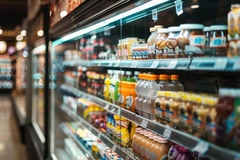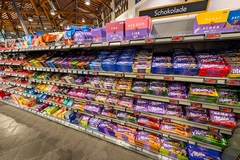
- Industry news
Industry news
- Category news
Category news
- Reports
- Key trends
- Multimedia
- Journal
- Events
- Suppliers
- Home
- Industry news
Industry news
- Category news
Category news
- Reports
- Key trends
- Multimedia
- Events
- Suppliers
Price Levels of Food Range from One to Two Among EU Member States

For bread and cereals, price levels ranged from 52% of the EU27 average in Bulgaria and 58% in Poland to 146% in Denmark and 132% in Ireland; for meat from 56% in Poland and 58% in Romania to 131% in Denmark and 128% in Austria.

29 Jun 2010 --- In 2009, the price level of a comparable basket of food and non-alcoholic beverages was more than twice as high in the most expensive EU27 Member State than in the cheapest one.
Denmark was nearly 40% above the EU27 average and had the highest price level for food and non-alcoholic beverages in the EU27 in 2009. Ireland, Finland, Luxembourg, Austria, Belgium, Germany and France were between 10% and 30% above the EU27 average. Italy, Cyprus, Sweden and Greece were up to 10% above the average, while the Netherlands, Spain, the United Kingdom, Slovenia, Malta and Portugal were up to 10% below. Latvia, Slovakia, Estonia, Hungary, the Czech Republic and Lithuania had price levels for food and non-alcoholic beverages which were between 10% and 30% below the EU27 average, while Bulgaria, Romania and Poland were between 30% and 40% below.
These data come from a report issued by Eurostat, the statistical office of the European Union. The results refer to the survey on food, beverage and tobacco prices carried out in 2009 in the 37 participating countries. This survey covered a total of approximately 500 comparable products.
Data are also available for more detailed breakdowns of food products. For bread and cereals, price levels ranged from 52% of the EU27 average in Bulgaria and 58% in Poland to 146% in Denmark and 132% in Ireland; for meat from 56% in Poland and 58% in Romania to 131% in Denmark and 128% in Austria; and for milk, cheese & eggs from 63% in Poland and 77% in Lithuania to 137% in Ireland and Cyprus.
The price levels for alcoholic beverages ranged from one to two and a half. The highest price levels for alcoholic beverages were registered in Finland (170% of the EU27 average), Ireland (167%), Sweden (138%) and Denmark (135%), and the lowest in Romania (70%), Bulgaria (77%), Spain and Hungary (both 84%).
For tobacco, the price levels were almost five times higher in the most expensive Member State than in the cheapest. The highest price levels were observed in Ireland (217% of the EU27 average), United Kingdom (166%), France (133%) and Sweden (130%), and the lowest in Bulgaria (46%), Romania (47%), Lithuania and Hungary (both 51%).
Meanwhile Agriculture Committee MEPs on Monday said that new legislation is needed to ensure fair returns to farmers and transparent prices to consumers, by enforcing fair competition throughout the food supply chain.
Suggestions as to how to ensure fairness throughout the food chain, by tacklíng dominant positions, unfair commercial and contractual practices and late payments, and also by improving the bargaining position of farmers, are set out in a report drafted by José Bové (Greens/EFA, FR) and approved with 32 votes in favour, four against and two abstentions. This report responds to a Commission communication on reforms needed to improve farmers' returns and consumer price transparency.
Penalties and a complaint mechanism should be put in place to discourage unfair behaviour by market players, says the committee. To monitor relations between producers and retailers and if necessary rebalance them, an EU-wide instrument could be put into effect through specialised bodies in the Member States. Actions to be taken should include an analysis of possible misuse of private labels, i.e. on retailers' "own brand" products, and a pilot project to create a European "observatory" of farm prices and margins, it adds.
The Commission is urged to propose legislation to limit dominant market positions at every stage of the supply chain, "including the food processing industry and retailers", says the text, which adds that companies engaging in unfair practices should be "named and shamed".
Top European traders, processors, wholesalers and retailers should have to report their market shares on key food items annually, and the Commission is urged to make a proposal to this end. This would allow all market players to estimate demand and supply trends, say MEPs.
The recently-approved European food price monitoring tool should be made more user friendly and cover a larger number of food products, so as to offer better comparability of data and make prices more transparent both for consumers and for farmers, adds the committee.
Standard contracts could be useful tools in preventing practices such as the alteration of contract terms, late payments, resale at a loss and unjustified listing fees, say MEPs. In some sectors, these contracts could even be made compulsory.
Specifically, the Commission is urged to examine the effects of "contract farming", imposed by buyers, which can weaken farmers' bargaining position. Finally, the committee asks that the Commission table legislation to reduce the maximum period allowed for payments from buyers to producers to 30 days for all.
Finally, the text asks the Commission to report on the issue of wasted food, which on some estimates accounts for up to 30% of food produced, and to launch a campaign to raise awareness of the value of food.










